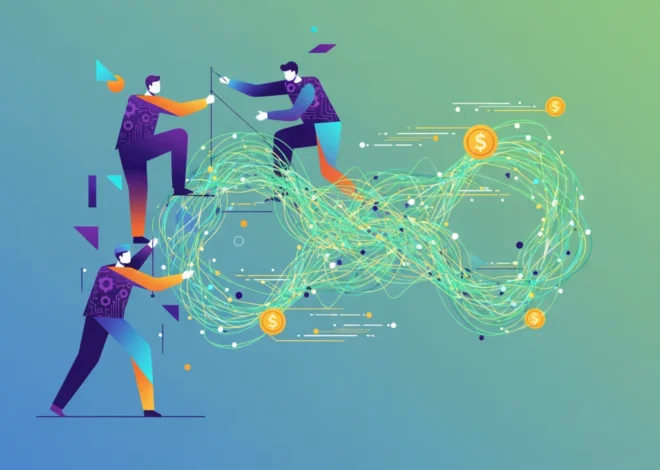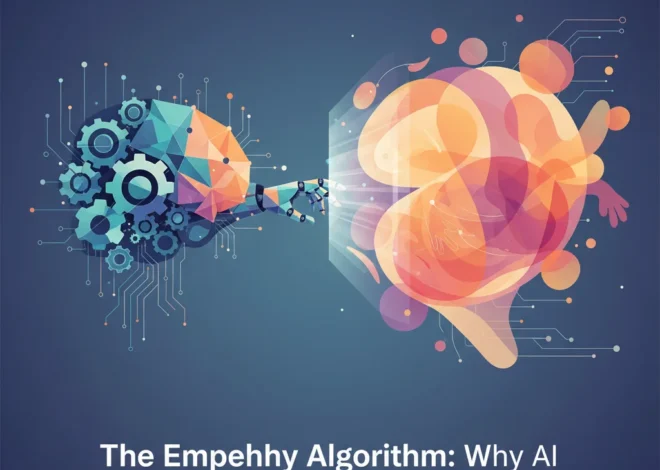
The AI Gold Rush is Over: Why Washington is About to Pop the Tech Bubble
We’re living through an unprecedented technological explosion. Artificial intelligence isn’t just a buzzword anymore; it’s a tidal wave of innovation, investment, and hype that’s reshaping entire industries. Every week, it seems a new AI startup achieves a mythical valuation, powered by brilliant minds and, more importantly, the colossal backing of Big Tech. The narrative has been simple: AI is an unstoppable force, a gold rush for the 21st century.
But what if the very foundation of this boom is also its greatest vulnerability? What if the hand that feeds the AI revolution is about to be slapped by regulators? That’s the unsettling question echoing from Washington D.C., where the Department of Justice (DOJ) and the Federal Trade Commission (FTC) are sharpening their antitrust knives. The target? The intricate, symbiotic, and potentially anti-competitive relationships between tech giants like Microsoft, Google, and Nvidia, and the AI darlings they’ve propped up, such as OpenAI and Anthropic.
The AI party has been wild, but the chaperones have just arrived. And they’re not happy with what they see. This isn’t just a minor regulatory headache; it’s a potential earthquake that could shake the entire tech landscape, impacting everyone from developers and entrepreneurs to the investors pouring billions into the sector.
The Symbiotic Dance: How Big Tech Fueled the AI Fire
To understand the looming threat, we first need to appreciate the current ecosystem. Building a powerful large language model (LLM) or a generative AI platform is astronomically expensive. It requires two things most startups don’t have: near-infinite computing power and a direct channel to millions of users.
Enter Big Tech. Companies like Microsoft, Amazon, and Google control the cloud infrastructure—the digital plumbing essential for training and running these complex models. They saw a golden opportunity. Instead of buying the most promising AI startups outright (a move that would immediately trigger antitrust alarms), they forged a new kind of partnership.
Consider the most famous example: Microsoft’s multi-billion dollar investment in OpenAI. Microsoft provides the Azure cloud credits and computing power OpenAI desperately needs. In return, Microsoft gets exclusive rights to integrate OpenAI’s groundbreaking technology into its entire suite of products, from Bing to Office 365, supercharging its SaaS offerings and driving more customers to its Azure cloud platform. It’s a win-win that has left competitors scrambling.
This model has been replicated across the industry. Google has backed Anthropic, and Amazon has invested in them as well. Nvidia, the undisputed king of AI chips, is also under scrutiny for its investment strategies and market dominance. These deals are less like traditional venture capital and more like strategic corporate maneuvers that create powerful, intertwined empires. According to the Financial Times, these arrangements allow Big Tech to “rent” innovation, effectively outsourcing their R&D while tightening their grip on the market.
The AI Paradox: Is Your Next Job Application Just Shouting into the Void?
Washington’s Wake-Up Call: The Antitrust Hammer Looms
For months, regulators seemed to be playing catch-up. But the game has changed. The DOJ and FTC have now reportedly divided the responsibility for launching antitrust investigations into the major players: the DOJ will take the lead on Nvidia, while the FTC will focus on Microsoft and OpenAI.
Their concern isn’t just about one company becoming a monopoly. It’s about a handful of powerful entities controlling the entire ecosystem, from the silicon chips to the software and cloud services. Regulators are looking at whether these complex partnerships and investments are, in effect, “creeping acquisitions” that stifle competition before it can even begin. They worry that new, independent AI companies won’t stand a chance if they can’t get a golden ticket from one of the tech titans.
This isn’t without precedent. Many analysts are drawing parallels to the landmark US v. Microsoft case in the late 1990s. Back then, the government argued that Microsoft illegally used its Windows monopoly to crush competitors like the web browser Netscape. The resulting legal battle, while not breaking up the company, is widely credited with curbing Microsoft’s aggressive tactics and creating space for the next generation of tech giants—like Google and Facebook—to emerge. Regulators may be hoping for a similar outcome here: to level the playing field and ensure the future of artificial intelligence isn’t decided in just a few boardrooms in Seattle and Silicon Valley.
The Magnificent Market Concentration
The concern over market power is backed by staggering numbers. The so-called “Magnificent Seven” tech stocks have driven a huge portion of the market’s gains, largely on the back of the AI narrative. Their immense resources create an almost insurmountable barrier to entry. Building a foundational AI model from scratch is a billionaire’s game, and there are only a few companies that can afford to play.
This concentration of power extends across the entire AI stack. Let’s break down the key players and their domains of influence.
| Tech Giant | Primary AI Partner(s) | Area of Market Dominance |
|---|---|---|
| Microsoft | OpenAI | Cloud Infrastructure (Azure), Enterprise Software (Office 365), Operating Systems |
| Nvidia | The entire AI industry | GPU Hardware (The essential chips for AI training and inference) |
| Google (Alphabet) | Anthropic, Internal (Gemini) | Cloud Infrastructure (GCP), Search, Digital Advertising, Mobile (Android) |
| Amazon | Anthropic | Cloud Infrastructure (AWS), E-commerce, Logistics |
As the table shows, a new startup not only has to develop innovative machine learning algorithms but also navigate a landscape where the infrastructure, hardware, and distribution channels are controlled by the very companies that are also funding their biggest competitors. This is the core of the antitrust argument. According to one top European venture capitalist quoted by the FT, the current situation means “you cannot create a B2B software company without being in the slipstream of Microsoft” (source). This dependency is what has regulators so concerned.
From Failed Gambit to Market Disruptor: How Valve's Console Dream Redefined Tech Innovation
Beyond AI: A Global Picture of Pressure and Power
While the AI antitrust story dominates the headlines, it’s part of a broader global story of market pressure and shifting power dynamics. The FT article also highlights two other significant situations that paint a picture of a volatile corporate world.
- The Deal Dance in France: Telecoms billionaire Patrick Drahi is under immense pressure to reduce the massive debt pile at his company, Altice. He’s been exploring deals to sell off parts of his French telecom empire, SFR. This is a classic example of market forces at work—high debt and competitive pressure forcing a powerful player to restructure and consolidate. It’s a reminder that even giants can be brought to heel by financial realities.
- Abu Dhabi’s Deal Machine: On the other side of the world, sovereign wealth funds like Abu Dhabi’s Mubadala are becoming increasingly powerful players in global finance and tech investment. The musical chairs at the top of these organizations signal strategic shifts that can send ripples through the markets they invest in, including the global tech scene.
These stories, while different from the AI antitrust issue, underscore a key theme: power is being challenged and reconfigured everywhere, whether through regulation, debt, or the rise of new global financial centers.
What Does This Mean for You?
So, the bubble might not “pop” in a dramatic 2001-style crash, but it is certainly being squeezed. The implications will be felt across the tech industry.
For Developers and Tech Professionals: Your skills in programming, AI, and machine learning are more valuable than ever. However, the platforms you build on could face significant changes. An antitrust ruling could force more openness, creating new opportunities on platforms that are less of a walled garden. Stay agile and be aware of the shifting alliances between the major cloud and AI providers.
For Entrepreneurs and Startups: The era of easy money from Big Tech may be ending. VCs will become more cautious about funding startups whose business models rely too heavily on a single, powerful partner. This is a double-edged sword. While securing that initial massive compute grant might get harder, it could also foster a more diverse ecosystem where startups with unique, independent solutions can thrive without being absorbed into a tech giant’s orbit.
For the General Public: Ultimately, this regulatory battle is about ensuring a competitive and innovative future. Healthy competition leads to better products, lower prices, and more choice. A world where a few companies control the future of AI is a world with less innovation and more centralized power. Washington’s actions, however disruptive in the short term, are aimed at preventing that future.
Google's AI Under the Microscope: Why the EU's New Probe Could Reshape the Internet
A New Chapter for Artificial Intelligence
The AI gold rush isn’t over, but the wild, unregulated frontier days are drawing to a close. The arrival of serious antitrust scrutiny marks the end of the beginning. The next 18-24 months will be a period of uncertainty, legal battles, and strategic repositioning. The symbiotic relationships that built the AI boom are now being viewed as a potential poison pill for the open market.
Will Washington’s intervention be a gentle course correction that fosters a healthier, more competitive ecosystem? Or will it be a clumsy, heavy-handed action that bursts the bubble and stifles American innovation at a critical moment? The answer is unclear, but one thing is certain: the AI industry is being forced to grow up, and the consequences will define the technological landscape for the next decade.


